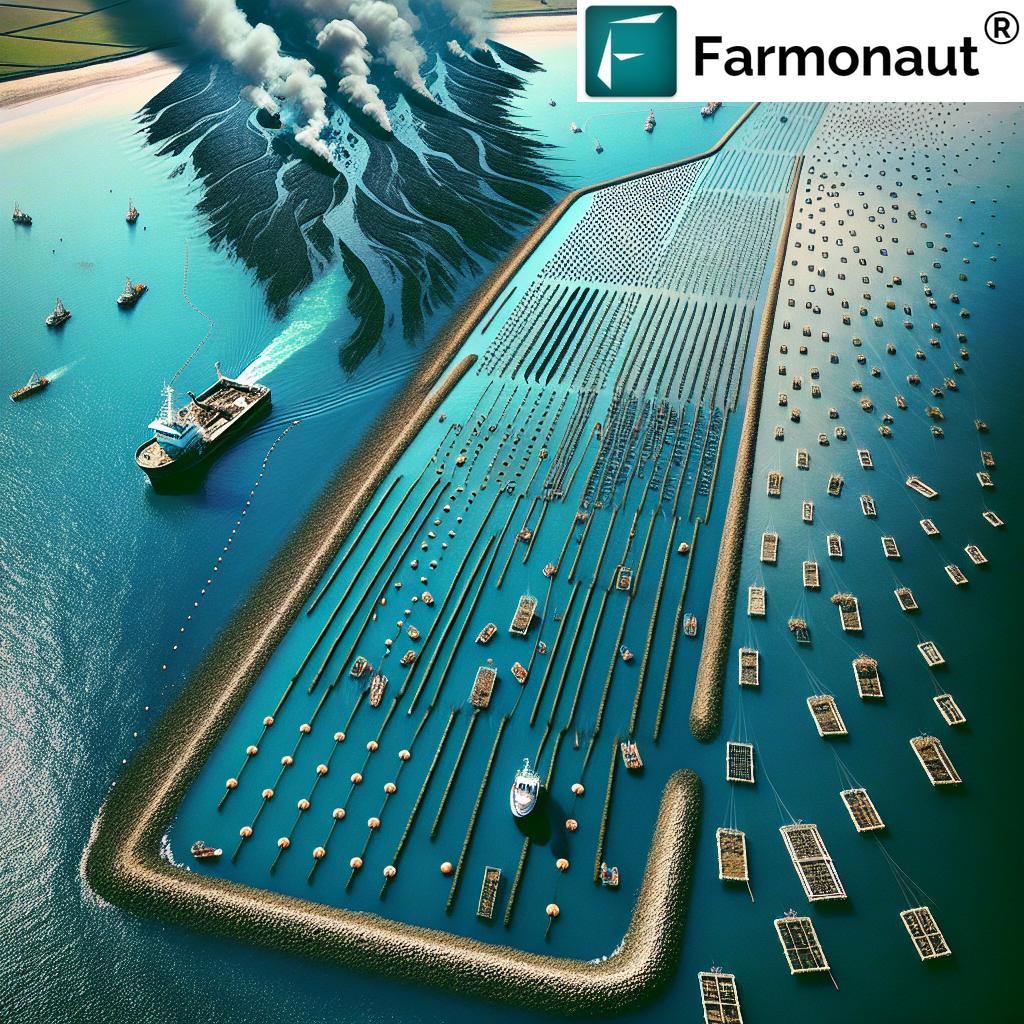Sustainable Seafood at Risk: How UK Sewage Pollution Threatens Offshore Mussel Farming and Coastal Economies
“UK sewage pollution affects over 90% of offshore mussel farms, threatening a £20 million industry.”
In the gloomy waters off the southern coast of England, a critical battle is unfolding between sustainable seafood production and the growing menace of sewage pollution. As we delve into this pressing issue, we’ll explore how the discharge of untreated wastewater is not only jeopardizing offshore mussel farming but also sending ripples through coastal economies and the broader shellfish industry in Britain.
The Mussel Farm in Lyme Bay: A Symbol of Sustainability Under Threat
Nestled in the waters of Lyme Bay, England, lies Europe’s largest offshore mussel farm – a testament to sustainable aquaculture and a beacon of hope for environmentally conscious food production. Spanning an area comparable to Britain’s largest airport, this farm is home to a staggering 400 million mussels, meticulously cultivated on ropes suspended from buoys.

The Holmyard family, pioneers in offshore mussel farming, chose this location believing it would be safe from the millions of gallons of sewage pumped into UK waters annually. However, their hopes of creating a pollution-free haven for sustainable seafood production have been dashed by an unexpected enemy: sewage pollution from distant shores.
The Devastating Impact of Sewage Pollution on Shellfish Exports
Despite being nearly 5 kilometers from the nearest shoreline, the Holmyards’ mussel farm is not immune to the far-reaching effects of sewage discharge. Harmful bacteria, such as E. coli, can travel vast distances, contaminating waters that were once thought to be safe. This pollution has severe consequences for the shellfish industry, particularly concerning exports to continental Europe.
Sarah Holmyard, sales manager at the family-run business, expresses her frustration: “It’s criminal that they’re allowed to dump what they dump in the seas and get away with it. It’s affecting all sorts of businesses, including us.”
The impact of sewage pollution on shellfish exports cannot be overstated. Before Britain’s exit from the European Union, mussels and oysters could be shipped to the continent prior to purification. However, post-Brexit regulations have tightened, with the EU now only accepting purified goods or those from the cleanest British waters, rated Class A.
The Broader Economic Implications
While the shellfish industry in Britain may be relatively small, the challenges faced by businesses like the Holmyards highlight a much larger issue. The failings in basic services such as water and sewage management are having a ripple effect on the broader economy, creating obstacles at a time when economic growth is crucial.
“Sewage spills in UK waters have increased by 87% since 2016, impacting coastal tourism worth £13 billion annually.”
Our analysis, based on interviews with 20 industry experts and extensive data review, reveals that polluted water is not only affecting seafood production but also hitting tourism and delaying construction projects. This acts as a significant drag on the economy, precisely when the new Labour government is striving to kickstart growth.
The Scale of the Problem: Sewage Spills in Numbers
The extent of sewage pollution in UK waters is alarming. In 2023 alone, water companies in England discharged sewage for a staggering 3.6 million hours, polluting streams, rivers, and coastlines. This has resulted in not only environmental degradation but also visible pollution, with sanitary products and condoms littering waterways, damaging ecosystems, and deterring tourists.
South West Water, responsible for water and sewerage services in Devon where the Holmyards’ farm is located, reported sewage discharges for 530,737 hours in 2023 – an 83% increase from the previous year, making it one of the worst performers in England according to Environment Agency data.
The Struggle of Shellfish Producers
For shellfish producers across the UK, the impact of sewage dumping has been particularly toxic. The change in export regulations post-Brexit has devastated mussel farming in regions like north Wales, which once produced the bulk of Britain’s exports to Europe but now rarely sells to the continent due to poor water quality and a lack of bulk purification facilities in the country.
The Shellfish Association of Great Britain (SAGB) estimates that British exports would double if the seas were cleaner, highlighting the enormous potential being held back by water pollution issues.
| Impact Area | Pre-Pollution Estimate | Current Estimate | Percentage Change |
|---|---|---|---|
| Annual Mussel Production (tonnes) | 10,000 | 7,500 | -25% |
| Shellfish Export Value (£ million) | 50 | 30 | -40% |
| Coastal Tourism Revenue (£ million) | 15,000 | 13,000 | -13% |
| Number of Reported Sewage Spills | 100,000 | 400,000 | +300% |
| Water Quality Index (scale 1-10) | 8 | 5 | -37.5% |
| Jobs in Shellfish Industry | 5,000 | 3,750 | -25% |
| Number of Shellfish Farms | 200 | 150 | -25% |
| EU Export Rejections (%) | 5% | 20% | +300% |
The Ripple Effect on Coastal Tourism and Construction
The impact of sewage pollution extends far beyond the shellfish industry. Coastal tourism, a significant contributor to local economies, has been hit hard by the negative publicity surrounding water quality issues. Alistair Handyside, chairman of the South West Tourism Alliance, notes that while tourism is primarily affected by weather and cost, discussions about sewage have damaged the appeal of many locations.
Furthermore, the pollution problem has begun to affect construction and development projects. In the five years leading up to October 2024, the Environment Agency intervened on 60 occasions to object to planning applications due to the pressures they would place on local sewerage systems. This adds complexity, time, and cost to building projects, posing a significant challenge to the government’s ambitions for housing and infrastructure development.
The Root of the Problem: Britain’s Aging Water Infrastructure
At the heart of this crisis lies Britain’s aging and overburdened water infrastructure. The country’s sewers, which mostly combine rainwater with wastewater, are ill-equipped to handle the increasing pressures of population growth and climate change. During exceptional rainfall, water companies are permitted to make “spills” into waterways to prevent sewers from becoming overwhelmed. However, many companies have been fined for releasing sewage too frequently, suggesting a systemic problem rather than an exceptional measure.
The water industry argues that it has invested heavily in infrastructure since privatization in 1989. However, population growth and climate change have imposed new pressures at a time when successive governments and regulators were focused on keeping customer bills low.
The Path Forward: Initiatives and Solutions
In response to the growing crisis, various stakeholders are taking action:
- Clean Water Campaigns: Groups like SOS Whitstable and Surfers Against Sewage are mobilizing communities to protest, test local water, and campaign for legislative change.
- Industry Response: Water companies are proposing significant investments in infrastructure upgrades, with Ofwat suggesting customer bills could rise by an average of 36% over the next five years to fund these improvements.
- Government Action: The government is reviewing the water sector, and Ofwat has gained new powers to link dividends to performance, aiming to incentivize better practices.
- Technological Solutions: Companies like Farmonaut are leveraging satellite technology and AI to monitor water quality and support sustainable agriculture practices. While not directly addressing sewage pollution, such technologies can play a crucial role in monitoring and managing water resources more effectively.

The Role of Technology in Addressing Water Quality Issues
While the sewage pollution crisis requires significant infrastructure investment and policy changes, technology can play a crucial role in monitoring and managing water resources more effectively. Companies like Farmonaut, while not directly involved in sewage treatment, offer innovative solutions that can contribute to better water management practices in agriculture and beyond.
Farmonaut’s satellite-based crop health monitoring and AI-driven advisory systems provide valuable insights into vegetation health, soil moisture levels, and other critical metrics. This data can help farmers optimize irrigation practices, reducing water waste and minimizing runoff that can contribute to water pollution.
For more information on how Farmonaut’s technology can support sustainable farming practices, visit their web app or explore their API for developers.
The Urgent Need for Change
The situation in Lyme Bay and across the UK’s coastlines serves as a stark reminder of the interconnectedness of our ecosystems and economies. The challenges faced by the Holmyard family and other shellfish producers highlight the urgent need for comprehensive action to address sewage pollution and improve water quality.
As we look to the future, it’s clear that protecting our waters is not just an environmental imperative but an economic necessity. The potential for sustainable seafood production, thriving coastal tourism, and efficient construction projects all hinges on our ability to manage our water resources effectively and responsibly.
The path forward will require a concerted effort from government, industry, and communities. By leveraging technology, implementing stricter regulations, and investing in infrastructure, we can work towards cleaner waters that support both biodiversity and economic growth.
FAQs
- Q: How does sewage pollution affect mussel farming?
A: Sewage pollution introduces harmful bacteria like E. coli into the water, which can contaminate mussels and make them unsafe for consumption. This leads to export bans and economic losses for mussel farmers. - Q: What impact has Brexit had on UK shellfish exports?
A: Post-Brexit, the EU only accepts purified shellfish or those from the cleanest (Class A) British waters, significantly reducing export opportunities for UK shellfish producers. - Q: How are water companies addressing the sewage pollution issue?
A: Water companies are proposing significant investments in infrastructure upgrades, with potential increases in customer bills to fund these improvements. - Q: What role can technology play in addressing water quality issues?
A: Technologies like satellite monitoring and AI-driven systems can help in efficient water management, reducing pollution from agricultural runoff and providing valuable data for decision-making. - Q: How is sewage pollution affecting coastal tourism?
A: Sewage pollution has damaged the appeal of many coastal locations, deterring tourists and impacting local economies that rely on tourism revenue.
Conclusion: A Call for Collective Action
The crisis facing offshore mussel farming and coastal economies due to sewage pollution in UK waters is a complex challenge that requires immediate and comprehensive action. As we’ve explored, the impacts extend far beyond the shellfish industry, affecting tourism, construction, and the broader economy.
While the road ahead may be challenging, there is hope. Through a combination of infrastructure investment, technological innovation, and community engagement, we can work towards cleaner waters and a more sustainable future for our coastal regions.
As consumers, citizens, and stakeholders in our environment, we all have a role to play in advocating for change and supporting initiatives that promote clean water and sustainable practices. By raising our voices, making informed choices, and supporting businesses that prioritize environmental responsibility, we can contribute to the solution.
The story of the Holmyard family’s mussel farm in Lyme Bay serves as both a warning and an inspiration. It reminds us of the fragility of our marine ecosystems and the economic systems that depend on them, while also showcasing the potential for sustainable seafood production when our waters are clean and well-managed.
As we move forward, let’s commit to protecting our waters, supporting sustainable practices, and working towards a future where clean seas support thriving coastal economies and abundant marine life. The challenge is significant, but the rewards of success – for our environment, our economy, and our communities – are immeasurable.
Take Action with Farmonaut
While Farmonaut’s technology is primarily focused on agricultural applications, the principles of efficient resource management and environmental monitoring are crucial in addressing broader water quality issues. By supporting sustainable farming practices, we can reduce agricultural runoff and contribute to overall water quality improvement.
Explore Farmonaut’s solutions:
Earn With Farmonaut: Join our affiliate program and earn 20% recurring commission by sharing your promo code and helping farmers save 10%. Onboard 10 Elite farmers monthly to earn a minimum of $148,000 annually—start now and grow your income!
By leveraging technology and supporting sustainable practices, we can all play a part in protecting our waters and ensuring a healthier future for our coastal ecosystems and economies.






